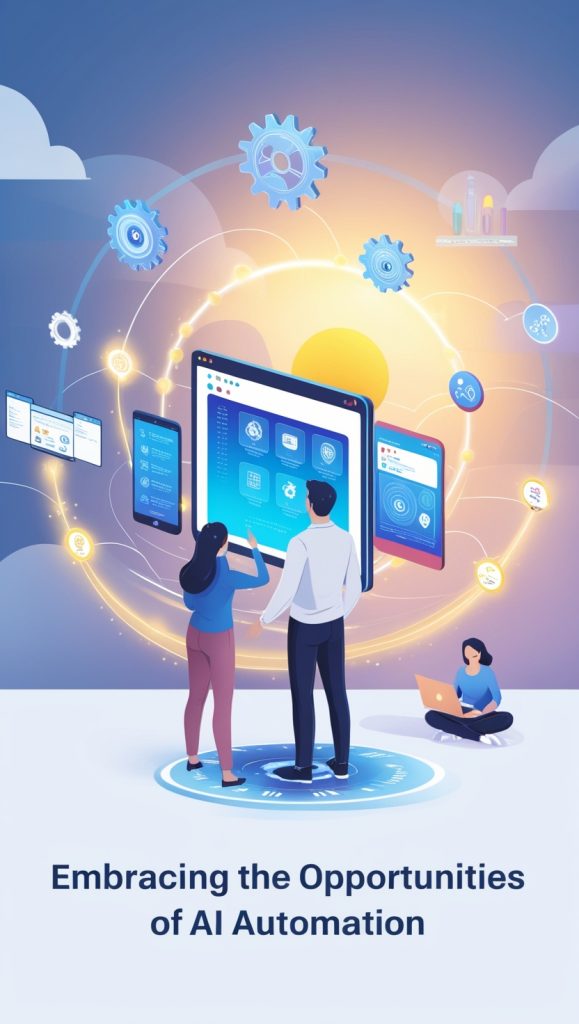Simplify Your Work with AI

The rise of artificial intelligence (AI) is transforming industries and reshaping the job market at an unprecedented pace. While concerns about job displacement are valid, AI automation also presents incredible opportunities for new roles and innovative career paths. Understanding this dynamic interplay of creation and displacement is crucial for individuals, businesses, and policymakers alike. This article delves into the impact of AI automation on jobs, exploring which roles are emerging, which are at risk, and how we can navigate this evolving landscape to thrive in the future of work.
The Impact of AI Automation on Jobs
AI automation is revolutionizing how we work, impacting jobs across various sectors. From automating repetitive tasks to augmenting human capabilities, AI is changing job descriptions and creating new demands. This shift presents both challenges and exciting opportunities for workers willing to adapt and embrace the potential of this transformative technology. Understanding the impact of AI on jobs is crucial for preparing for the future of work.
Jobs Created by AI Automation
While AI-driven automation may displace certain jobs, it also creates exciting new career opportunities. These new roles often involve developing, implementing, and maintaining AI systems, as well as leveraging AI to improve processes and create innovative solutions.
AI Specialists & Engineers
AI specialists and engineers are at the forefront of this technological revolution. These roles, including Machine Learning Engineers, Data Scientists, AI Trainers, and Robotics Specialists, are in high demand. Designing, building, and maintaining AI systems requires specialized skills and expertise, making these careers highly sought after. Moreover, the increasing focus on responsible AI development has given rise to the crucial role of AI Ethicists, who ensure ethical considerations are integrated into AI systems.
AI-Related Support Roles
Beyond specialized engineering roles, AI is creating numerous support positions. Data Labelers and Annotators ensure AI algorithms have high-quality training data. AI System Administrators maintain the infrastructure behind AI operations. AI Trainers and Instructors educate others on using AI tools effectively. As AI becomes more integrated into businesses, the need for AI Customer Support Specialists to address user inquiries and technical issues also grows.
Roles in Newly Created Industries
AI is not just transforming existing industries; it’s also giving rise to entirely new sectors. These include AI-driven personalized services, like personalized healthcare and education, as well as automation-facilitated creative industries, such as AI-generated music and art. These emerging fields offer exciting career paths for those interested in leveraging AI’s creative and problem-solving potential.
Jobs at Risk from AI Automation
While AI creates new opportunities, it also poses a threat to jobs involving repetitive, predictable tasks that can be easily automated.
Repetitive and Routine Tasks
Jobs involving repetitive and routine tasks are most susceptible to automation. These include roles like Data Entry Clerks, Telemarketers, Factory Workers (especially on assembly lines), Truck Drivers, and Cashiers. As AI and robotics advance, these tasks can be automated, potentially leading to job displacement.
White-Collar Jobs Facing Partial Automation
AI’s impact extends beyond manual labor. Certain aspects of white-collar jobs are also vulnerable to automation. Accountants and Auditors may find basic tasks automated. Legal Professionals might see document review handled by AI. Financial Analysts could experience automation in report generation. Even Journalists face potential automation in basic reporting tasks. This emphasizes the need for professionals to develop skills that complement AI, rather than those easily replaced by it.
The Importance of Adaptability
Adaptability is key in the age of AI. Even jobs not directly threatened by automation will require individuals to adapt to using AI tools and technologies. This means continuous learning and a willingness to embrace new skills will be essential for staying relevant in the evolving job market.
Navigating the Changing Job Landscape
Successfully navigating the changing job landscape requires focusing on future-proof skills and embracing lifelong learning.
Skills for the Future of Work
Critical Thinking and Problem-Solving, Creativity and Innovation, Complex Communication and Collaboration, Emotional Intelligence and Empathy, and Digital Literacy and Technological Adaptability are crucial skills for the future of work. These skills complement AI capabilities and allow humans to focus on tasks requiring uniquely human traits.
Education and Training for AI-Related Careers
Preparing for AI-related careers requires focused education and training. Online courses and certifications, Bootcamps and specialized programs, and Traditional university degrees offer pathways to acquire the necessary skills. Lifelong learning and upskilling are essential for staying ahead of the curve in this rapidly evolving field.
The Ethical Considerations of AI Automation
As AI automation becomes more prevalent, it’s crucial to address the ethical implications.
Job Displacement and Social Impact
Job displacement due to AI automation can exacerbate existing inequalities. Implementing social safety nets and retraining programs is crucial to mitigate these negative impacts and ensure a just transition for affected workers.
Bias and Fairness in AI Systems
AI systems are trained on data, which can reflect existing societal biases. Addressing algorithmic bias and ensuring equitable outcomes is paramount to building responsible and fair AI systems.
The Future of Work in an AI-Driven World
The future of work will involve collaboration between humans and AI.
Human-AI Collaboration
The future of work isn’t about humans vs. AI, but rather humans with AI. This involves focusing on tasks that require uniquely human skills, such as creativity, critical thinking, and emotional intelligence, while leveraging AI to augment human capabilities and improve productivity.
The Evolving Nature of Work
AI is driving a shift towards project-based work and the gig economy. The ability to adapt to different work arrangements and embrace continuous learning will be essential for success in this evolving work environment.
Conclusion: Embracing the Opportunities of AI Automation
AI automation presents both challenges and opportunities. By understanding the changing landscape, developing crucial skills, and embracing lifelong learning, we can navigate this transition successfully and harness the transformative power of AI to create a more prosperous and fulfilling future of work.
Frequently Asked Questions
What jobs will AI create?
AI will create numerous jobs in areas like AI engineering, data science, AI training, and AI-related support roles. New industries focused on AI-driven services and automation-facilitated creative fields will also generate new career paths.
What jobs are at risk because of AI?
Jobs involving repetitive and routine tasks are most at risk, including data entry, telemarketing, and certain factory jobs. Some white-collar jobs will also see partial automation of specific tasks.
What skills are needed for the future of work with AI?
Critical thinking, problem-solving, creativity, communication, emotional intelligence, and digital literacy are crucial skills to thrive in an AI-driven world.
How can I prepare for an AI-related career?
Online courses, bootcamps, specialized programs, and traditional degrees can provide the necessary education and training for AI-related careers. Continuous learning and upskilling are also essential.
What are the ethical concerns of AI automation?
Ethical concerns include job displacement and its social impact, as well as bias and fairness in AI algorithms. It’s crucial to address these issues proactively to ensure a positive and equitable future with AI.
Will AI take over all jobs?
While AI will automate many tasks, it’s unlikely to take over all jobs. The future of work will likely involve human-AI collaboration, where humans focus on tasks requiring uniquely human skills and leverage AI to enhance their capabilities.
What is the importance of adaptability in the context of AI?
Adaptability is crucial because even jobs not directly threatened by automation will require individuals to adapt to working with AI tools. Continuous learning and a willingness to embrace new skills are essential.
How will AI impact the nature of work?
AI is expected to increase project-based work and the gig economy, requiring individuals to be flexible and adaptable to different work arrangements.
What are the potential benefits of AI automation?
AI automation can increase efficiency, productivity, and innovation, freeing up humans to focus on more complex and creative tasks. It can also create new opportunities and improve decision-making.
How can we mitigate the negative impacts of AI automation?
Social safety nets, retraining programs, and a focus on education and skills development can help mitigate the negative impacts of job displacement and ensure a just transition for workers.


